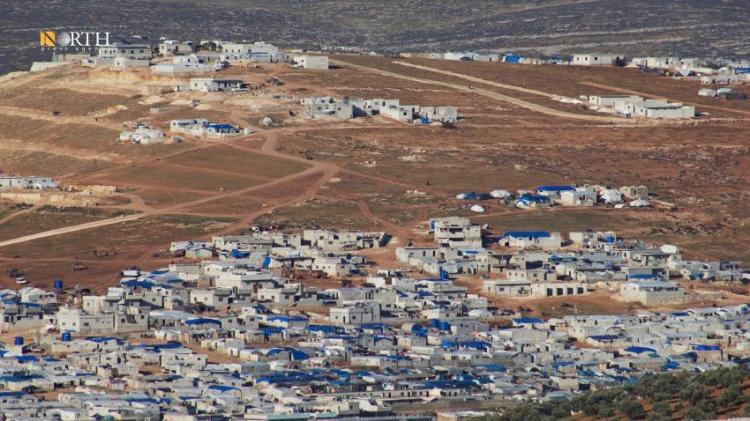IDPs in Idlib camps suffer from spread of scorpions and snakes
IDLIB, Syria (North Press) – IDPs in Idlib's camps, northwestern Syria, are increasingly concerned about their family members, especially children, with the spread of scorpions and poisonous snakes. These creatures appeared with increasing temperatures in the month of July. This is accompanied by the lack of a vaccine antioxidant serum at the health committees in those camps, and the supervisory authorities' indifference to the risks posed by poisonous insects and reptiles to the lives of the displaced.
Omar al-Saloum, a displaced person living in the Deir Hassan camps north of Idlib, said that he managed to kill a snake two meters long which almost bit one of his children after leaving the rocks near his tent, and four scorpions were found, one of them inside the tent.”
Scorpions and snakes have become a source of horror for his children and wife, especially after finding a number of them inside and outside his tent during the past days.
High temperatures led to the emergence of scorpions and snakes in the camp, which prompted Saloum to submit several complaints to the camp administration, which is affiliated with the Salvation Government a Syrian opposition government backed by Hayat Tahrir al-Sham, seen as illegitimate by the Syrian Interim Government, about the necessity of distributing the vaccine and anti-toxins to the displaced, but received no response.
Ali al-Zahir, a displaced person from Hama countryside, told North Press that, "the spread of these types of reptiles and poisonous insects has caused panic and fear among children."
He added that he was not able to sleep in fear for his family after he managed to kill three snakes in one week near his tent, which prompted him to make a high metal bed inside the tent to protect his children and his wife from these animals.
Snakes and scorpions that move out of their burrows due to high temperatures pose a risk to the safety of camp’s residents, like Deir Hassan camp, which is built on rocky barren land near the Syrian-Turkish border.
A one-and-a-half-year-old girl from Deir Hassan camp died in late May due to a scorpion sting, which aroused the concerns of the camp’s residents.
The large numbers of displaced people, the crowding of camps, the lack of sanitation facilities and the accumulation of waste, the most important thing that impedes the disposal of insects and helps in the spread of epidemics in several regions of Syria, where the humid environment and open sewage pools in the camps are a suitable place for insects and scorpions that are active in the summer nights, according to administrators in these camps.
Dozens of young men and children are seen on a daily basis searching for scorpions and snakes in the Deir Hassan camps, where scorpion hunting has become a hobby for some of them, despite its seriousness.
Fadi Fardos, an IDP in Deir Hassan camp, told North Press that he had bitten by a scorpion while he was sleeping, he couldn’t get first aid, and was taken to a hospital in al-Dana and treated there.
Alaa Mahmoud, an activist from the Deir Hassan area, told North Press that snake antivenom is only available in hospitals in near cities and towns, coinciding with the entry of snakes into the tents to escape the sunlight with increasing temperatures. It portends a catastrophe and great risks for the displaced, especially children.

